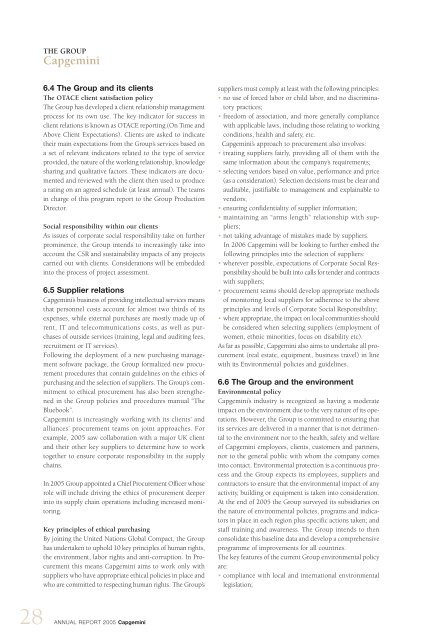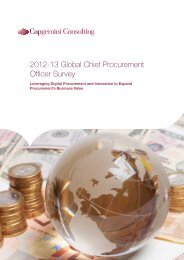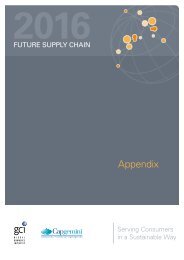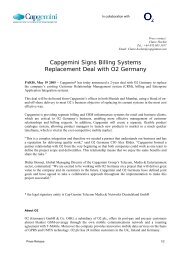You also want an ePaper? Increase the reach of your titles
YUMPU automatically turns print PDFs into web optimized ePapers that Google loves.
28 ANNUAL<br />
THE GROUP<br />
<strong>Capgemini</strong><br />
6.4 The Group and its clients<br />
The OTACE client satisfaction policy<br />
The Group has developed a client relationship management<br />
process for its own use. The key indicator for success in<br />
client relations is known as OTACE reporting (On Time and<br />
Above Client Expectations). Clients are asked to indicate<br />
their main expectations from the Group’s services based on<br />
a set of relevant indicators related to the type of service<br />
provided, the nature of the working relationship, knowledge<br />
sharing and qualitative factors. These indicators are documented<br />
and reviewed with the client then used to produce<br />
a rating on an agreed schedule (at least annual). The teams<br />
in charge of this program report to the Group Production<br />
Director.<br />
Social responsibility within our clients<br />
As issues of corporate social responsibility take on further<br />
prominence, the Group intends to increasingly take into<br />
account the CSR and sustainability impacts of any projects<br />
carried out with clients. Considerations will be embedded<br />
into the process of project assessment.<br />
6.5 Supplier relations<br />
<strong>Capgemini</strong>’s business of providing intellectual services means<br />
that personnel costs account for almost two thirds of its<br />
expenses, while external purchases are mostly made up of<br />
rent, IT and telecommunications costs, as well as purchases<br />
of outside services (training, legal and auditing fees,<br />
recruitment or IT services).<br />
Following the deployment of a new purchasing management<br />
software package, the Group formalized new procurement<br />
procedures that contain guidelines on the ethics of<br />
purchasing and the selection of suppliers. The Group’s commitment<br />
to ethical procurement has also been strengthened<br />
in the Group policies and procedures manual “The<br />
Bluebook”.<br />
<strong>Capgemini</strong> is increasingly working with its clients’ and<br />
alliances’ procurement teams on joint approaches. For<br />
example, <strong>2005</strong> saw collaboration with a major UK client<br />
and their other key suppliers to determine how to work<br />
together to ensure corporate responsibility in the supply<br />
chains.<br />
In <strong>2005</strong> Group appointed a Chief Procurement Officer whose<br />
role will include driving the ethics of procurement deeper<br />
into its supply chain operations including increased monitoring.<br />
Key principles of ethical purchasing<br />
By joining the United Nations Global Compact, the Group<br />
has undertaken to uphold 10 key principles of human rights,<br />
the environment, labor rights and anti-corruption. In Procurement<br />
this means <strong>Capgemini</strong> aims to work only with<br />
suppliers who have appropriate ethical policies in place and<br />
who are committed to respecting human rights. The Group’s<br />
REPORT <strong>2005</strong> <strong>Capgemini</strong><br />
suppliers must comply at least with the following principles:<br />
• no use of forced labor or child labor, and no discriminatory<br />
practices;<br />
• freedom of association, and more generally compliance<br />
with applicable laws, including those relating to working<br />
conditions, health and safety, etc.<br />
<strong>Capgemini</strong>’s approach to procurement also involves:<br />
• treating suppliers fairly, providing all of them with the<br />
same information about the company’s requirements;<br />
• selecting vendors based on value, performance and price<br />
(as a consideration). Selection decisions must be clear and<br />
auditable, justifiable to management and explainable to<br />
vendors;<br />
• ensuring confidentiality of supplier information;<br />
• maintaining an “arms length” relationship with suppliers;<br />
• not taking advantage of mistakes made by suppliers.<br />
In 2006 <strong>Capgemini</strong> will be looking to further embed the<br />
following principles into the selection of suppliers:<br />
• wherever possible, expectations of Corporate Social Responsibility<br />
should be built into calls for tender and contracts<br />
with suppliers;<br />
• procurement teams should develop appropriate methods<br />
of monitoring local suppliers for adherence to the above<br />
principles and levels of Corporate Social Responsibility;<br />
• where appropriate, the impact on local communities should<br />
be considered when selecting suppliers (employment of<br />
women, ethnic minorities, focus on disability etc).<br />
As far as possible, <strong>Capgemini</strong> also aims to undertake all procurement<br />
(real estate, equipment, business travel) in line<br />
with its Environmental policies and guidelines.<br />
6.6 The Group and the environment<br />
Environmental policy<br />
<strong>Capgemini</strong>’s industry is recognized as having a moderate<br />
impact on the environment due to the very nature of its operations.<br />
However, the Group is committed to ensuring that<br />
its services are delivered in a manner that is not detrimental<br />
to the environment nor to the health, safety and welfare<br />
of <strong>Capgemini</strong> employees, clients, customers and partners,<br />
nor to the general public with whom the company comes<br />
into contact. Environmental protection is a continuous process<br />
and the Group expects its employees, suppliers and<br />
contractors to ensure that the environmental impact of any<br />
activity, building or equipment is taken into consideration.<br />
At the end of <strong>2005</strong> the Group surveyed its subsidiaries on<br />
the nature of environmental policies, programs and indicators<br />
in place in each region plus specific actions taken; and<br />
staff training and awareness. The Group intends to then<br />
consolidate this baseline data and develop a comprehensive<br />
programme of improvements for all countries.<br />
The key features of the current Group environmental policy<br />
are:<br />
• compliance with local and international environmental<br />
legislation;















